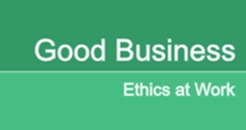 Good Business: Ethics at Work
Good Business: Ethics at Work
Since the 18th century, in the UK, businesses owned and run by Quakers have earned a reputation for trust, integrity, fair trading, care of their employees and betterment of the local community and society at large. With trust based on the quality of goods and service, and an honest and straightforward approach to pricing, many of these businesses were hugely successful and, while no longer under the control of their founders' families, remain well known brands. Their trade was considered fair because it respected workers' rights and minimized environmental damage.
While working conditions are much better than in the 18th and 19th centuries, the world of work and business is still an imperfect one.
Today, many people are so dismayed by the unethical business practices they see around them that they believe that business itself is unethical. Some consider that making a profit is wrong. Those in business - ourselves included - know that to be sustainable a business must be profitable. But we also know that what a business does to make a profit affects individuals, communities and the environment - for good or bad.
The Quakers and Business Group have just published an updated edition of 'Good Business: Ethics at Work’. This straightforward ~50 page book has been very successful both in the UK and abroad.
The book's objective remains the same, to act as a guide and inspiration to running a better and ethical business for the benefit of all its stakeholders. We know that living up to these standards is not always easy, but they have a practical as well as an ethical benefit. Businesses known for their ethical conduct gain from a good reputation, customer loyalty and a more committed workforce.
The book is structured as Advices and Queries. It offers an advice, of which there are 43, such as on employee's pay or when invoices should be paid, and then asks questions that help you understand how you should act and how you could plan to work differently.
It's a useful book for everyone, as it helps you understand how any organisation you work in or work with, even your local supermarket, could operate better.
For the first time the book has been published under a Creative Commons licence, which means that the work can be used and built on by others free of charge within the restrictions of the licence.
To read online for free as a pdf and electronic book (epub), or buy a paperback copy click here.
Retweet about this article:
From a publication of Quakers and Business Group, 04/12/2019